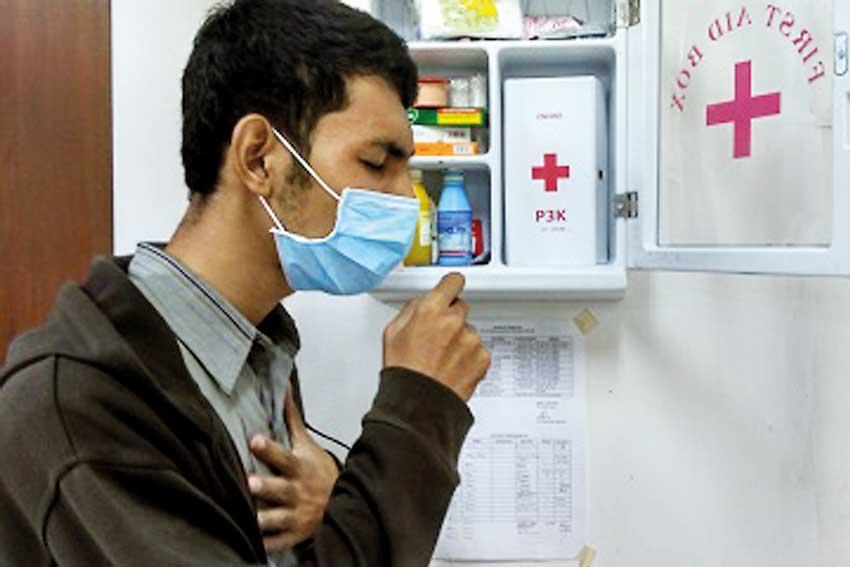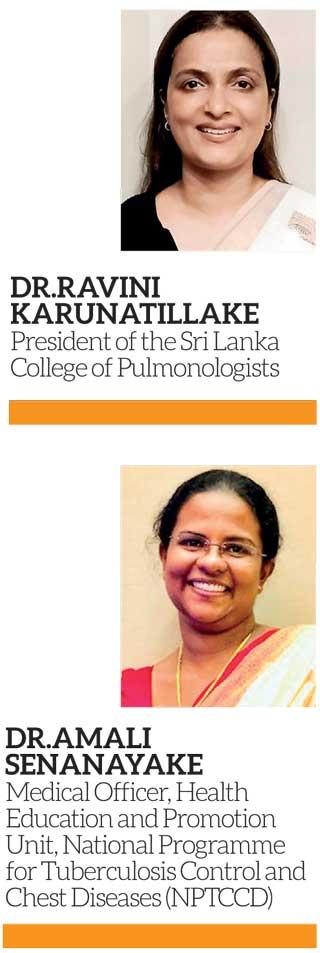25 Mar 2022 - {{hitsCtrl.values.hits}}

 Tuberculosis (TB) is a disease that has been detected even in Egyptian mummies, but has not been eradicated yet. Speaking to Daily Mirror, Dr. Ravini Karunatillake, President of the Sri Lanka College of Pulmonologists mentioned that Sri Lanka is committed to end TB by 2035. “This is an infectious disease that is transmitted via droplets containing Mycobacterium tuberculosis. Unlike COVID-19, it does not spread far and wide but is infectious. However, not everyone who gets TB will have the disease. Some will have the bacteria within the body for a long period of time (Latent TB). When their immunity gets compromised, they will show symptoms of the disease and be affected.” Sri Lanka reported 7,258 and 6,771 new TB cases in 2020 and 2021 which was far behind the WHO estimate of 14,000 patients per year. “There has been a decrease in reporting of cases because the pandemic hampered our screening programmes and also people haven’t been able to access the clinics,” explained Dr. Amali Senanayake, Medical Officer, Health Education and Promotion Unit, National Programme for Tuberculosis Control and Chest Diseases (NPTCCD). Prior to the pandemic, around 10,000 cases of TB were reported per year.
Tuberculosis (TB) is a disease that has been detected even in Egyptian mummies, but has not been eradicated yet. Speaking to Daily Mirror, Dr. Ravini Karunatillake, President of the Sri Lanka College of Pulmonologists mentioned that Sri Lanka is committed to end TB by 2035. “This is an infectious disease that is transmitted via droplets containing Mycobacterium tuberculosis. Unlike COVID-19, it does not spread far and wide but is infectious. However, not everyone who gets TB will have the disease. Some will have the bacteria within the body for a long period of time (Latent TB). When their immunity gets compromised, they will show symptoms of the disease and be affected.” Sri Lanka reported 7,258 and 6,771 new TB cases in 2020 and 2021 which was far behind the WHO estimate of 14,000 patients per year. “There has been a decrease in reporting of cases because the pandemic hampered our screening programmes and also people haven’t been able to access the clinics,” explained Dr. Amali Senanayake, Medical Officer, Health Education and Promotion Unit, National Programme for Tuberculosis Control and Chest Diseases (NPTCCD). Prior to the pandemic, around 10,000 cases of TB were reported per year.
 The Western Province reported around 44.6% of TB cases while Colombo district had the highest number of reported cases in 2021, accounting to 24.9% of reported cases. Dr. Karunatillake noted that TB could affect anyone as it was an infectious disease, but that it was more likely to hover around and infect people in crowded and congested spaces. “People think only a certain social stratum of people can be infected with TB, but that’s not the case. It can infect anyone. This stigma has to go away. People hesitate to test and get themselves treated or allow contact screening due to this stigma.” She urged people to get themselves tested and treated as early as possible as early treatment can help protect loved ones and also protect one’s lungs from long-term damage such as lung scarring.
The Western Province reported around 44.6% of TB cases while Colombo district had the highest number of reported cases in 2021, accounting to 24.9% of reported cases. Dr. Karunatillake noted that TB could affect anyone as it was an infectious disease, but that it was more likely to hover around and infect people in crowded and congested spaces. “People think only a certain social stratum of people can be infected with TB, but that’s not the case. It can infect anyone. This stigma has to go away. People hesitate to test and get themselves treated or allow contact screening due to this stigma.” She urged people to get themselves tested and treated as early as possible as early treatment can help protect loved ones and also protect one’s lungs from long-term damage such as lung scarring.
Diagnosing and treating TB
For diagnosis of TB, multiple tests may be done such as blood tests, chest x-rays, sputum examination, PCR and TB culture. Dr. Karunatillake also mentioned that a drug regime for 6 months or more would be given to treat the patient. “It is very important for the patient to take the medicines properly and this is monitored by health workers. If at the end of the treatment, the bacteria is not detected during the tests - then we can say the patient is cured.”
Dr. Senanayake mentioned that the treatment and testing is provided free of charge at the district chest clinics and that the Social Services Ministry has allocated a monthly allowance during the course of the treatment for those from disadvantaged backgrounds.
TB drug resistance
The treatment regime has to be strictly followed to prevent resistance to the drugs. If resistance is formed, it could lead to multi-drug resistant tuberculosis (MDR-TB) which is harder to treat. “To cure MDR-TB, more drugs have to be used for a prolonged period of time - up to maybe 2 years! And a person with MDR-TB can transmit MDR-TB to another person, which would lead to increased cases causing a public health crisis,” Dr Karunatillake noted, adding that Sri Lanka has a small percentage of those with MDR-TB and the patients were being carefully monitored.
TB testing for migration
She also shared that the International Organisation for Migration (IOM) conducts TB tests for those wishing to migrate or study in certain countries as it is a requirement for the acquisition of visa to these countries for long-term stay.
Eradicating TB, the way forward
NPTCCD conducts screening programmes for vulnerable populations (immunocompromised people, prisoners) and also looks forward to widen the scope of treatment for Latent TB so that treatment is accessible to everyone with Latent TB. Dr. Karunatillake also urged people to test for TB and ensure early treatment as it was a curable disease. “Due to the childhood BCG vaccine, miliary TB and TB meningitis is not seen. But pulmonary TB can be cured if detected early and if treatment is followed properly,” shared Dr. Senanayake.
20 Dec 2024 2 hours ago
20 Dec 2024 3 hours ago
20 Dec 2024 4 hours ago
20 Dec 2024 5 hours ago
20 Dec 2024 5 hours ago